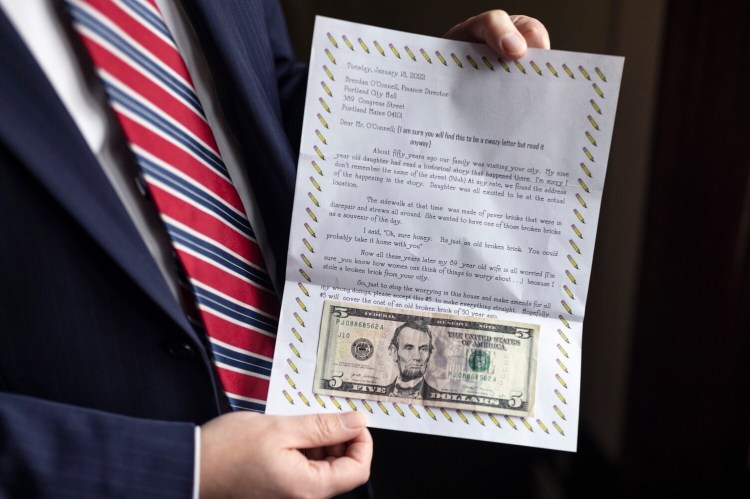Brendan O’Connell is used to opening invoices, requests for payment, donations and even the occasional angry letter that lands on his desk at Portland City Hall.
Last Wednesday, the city’s finance director found a hand-addressed envelope and knew this was going to be different.
Inside the envelope postmarked in California, he found a letter from a man making amends for taking a piece of broken sidewalk home from Portland half a century ago.

Brendan O’Connell, Portland’s finance director, with the letter he received from a man who sent $5 to pay for a broken sidewalk brick his daughter took home as a souvenir from the city about 50 years ago. Brianna Soukup/Staff Photographer
“I could tell right away it was going to be something interesting. Usually handwritten letters like that include something on the personal side,” he said. “It had that feel of something written by a grandparent. It was sweet and cute to read.”
The letter, framed by a border of yellow pencils and printed in a fanciful font, is addressed to O’Connell and begins with a parenthetical note: “I am sure you will find this to be a cwazy letter but read it anyway.” O’Connell isn’t sure if “cwazy” is a typo or if the man is “ridiculously cute,” but he loves it either way.
The letter writer, Roy Pitts, goes on to explain that he visited Portland about 50 years ago with his family, including his 9-year-old daughter. She had read a historical story about the city and was excited when her family found the actual location in that story. Pitts said he could remember neither the historical story or the street where it took place.
“The sidewalk at the time was made of paver bricks that were in disrepair and strewn all around. She wanted to have one of those bricks as a souvenir of the day,” Pitts wrote. “I said ‘Oh, sure honey. It’s just an old brick. You could probably take it home with you.'”
Fast-forward through the decades.
“Now all these years later, my 89 year old wife is all worried (I’m sure you know how women can think of things to worry about …) because I stole a brick from your city,” the letter continued.
Pitts included $5 “just to stop the worrying in this house and make amends for all my wrong doings.”
“Hopefully $5 will cover the cost of an old broken brick of 50 years ago,” he concluded.
O’Connell said there’s no way to tell if that $5 actually covers the value of that brick, but the money will be considered a donation and likely allocated toward capital improvements by the City Council, which formally accepts all donations. And O’Connell plans to write back to Pitts to thank him for his gift and highlight the millions of dollars the city has spent in recent years to repair roads and sidewalks.
“I love that stationery and will probably use a similar stationery in my response,” O’Connell said.
Attempts to reach Pitts at his home in California were unsuccessful.
After he read the letter, O’Connell knew others would find it equally endearing. He shared it first with co-workers at City Hall. Some said things like, “Honesty is the best policy.” A department head suggested that O’Connell send a receipt noting the city had waived 50 years of accumulated interest.
Interesting letter of the day: “about 50 years ago… I stole a broken brick from your City”
If anyone has any ideas on the “historical story that happened there” let me know! pic.twitter.com/w1WoH4hcv0
— Brendan T. O'Connell (@PortlandCFO) January 26, 2022
O’Connell also shared the letter on Twitter, where people immediately piped in with commentary about the man’s choice of font, the pencil border and guesses about the true cost of the brick when inflation is taken into account. Some speculated that the historical story that had excited the young girl could have been “Mystery in Longfellow Square,” a book for young readers first published in 1964.
“So that’s where that brick went,” Jeff Levine, a former Portland planning director, wrote in response to O’Connell’s tweet.
This isn’t the first time a Maine community has received a letter from someone looking to settle a decades-old debt. Back in 2020, a Massachusetts man paid a parking ticket from Long Sands Beach he had received nearly 42 years earlier. Gary Urgonski mailed a letter, the ticket from July 28, 1978, and a $4 check to the York Police Department.
Urgonski’s letter read in part, “I hope I can now safely travel through the state of Maine without always looking in my rearview mirror.”
Send questions/comments to the editors.




Comments are no longer available on this story